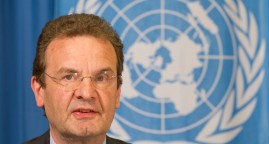The Humanitarian Caste System?
Syrians are everyone’s new favourite refugees.
But the growing perception that they receive preferential treatment from governments, volunteers and aid agencies is undermining humanitarian principles and causing serious problems for responders in Lesvos and beyond. Imogen Wall reports.
In the Kara Tepe processing centre in Lesvos, where Syrian refugees are registered after clambering off boats from Turkey, new arrivals are met by the smiling faces of International Rescue Committee staff and bottles of water. Young girls and boys have their faces painted by Save the Children, while their parents wait in well-organised lines for registration at UN refugee agency (UNHCR) booths. At the Médecins Sans Frontières (MSF) daily clinic in Kara Tepe, patients wait on neatly arranged wooden benches. For those who need to stay, there are brand new UNHCR transitional shelters and sturdy tents erected in tidy rows on freshly gravelled ground under the shade of olive trees.
But just a kilometre down the road is a different and far darker world. The Moria immigration centre is a prison-like building with high barbed-wire fences and forbidding gates, now surrounded by a filthy ad hoc camp. Outside, entire families cram into makeshift shelters consisting of tarpaulins tied to the wire fence. Hundreds more sit in the hot sun.
The difference? Kara Tepe is for Syrians only. Everyone else must go to Moria.
“We call it the humanitarian caste system,” said one international NGO volunteer, who did not want to be named. “We see it in donations. We see it in volunteer interest. And we see it from the governments.”
See the all story on Irin website
Related Articles
VOA Documentary: Displaced
11/15/2018. Behind the walls of the Kutupalong refugee camp in Bangladesh to hear their stories of murder and rape
Why We Need a Global Business Council for Refugees
06/28/2017. As the largest wave of human displacement since World War II continues to unfold, an all-hands-on-deck response is required and must be scaled up.
World Refugee Day: Albrecht Boeselager’s statement on the current crisis
06/16/2015. “Faced with this drama and the desperation of millions of people, we now have to find new humanitarian assistance schemes, new forms of cooperation with the countries of origin …”





